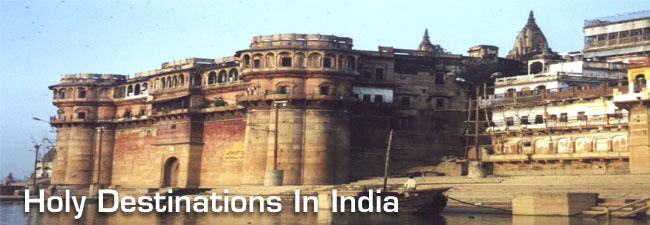 Chidambaram
Chidambaram
The temple town of Chidambaram, 58 km south of Pondicherry
greets the visitors, with a beautiful temple, dedicated to Lord
Nataraja - Lord Shiva in the enthralling form of a Cosmic Dancer.
This is one of the few temples, where Shiva and Vishnu are enshrined
under one roof. Chidambaram is also called Thillai, since the
place was originally a forest of Thillai shrubs. It is one of
the five Shaivite mukti sthalams, the other four being Kalahasti,
Kanchipuram, Tiruvannamalai and Tiruvanaikaval. A unique feature
of Chidambaram is that a person of any race or religion can
visit the shrine and pray.
The island of Rameswaram on the Gulf of Mannar is one of the
main fishing villages in Tamil Nadu. More importantly, it is
a major pilgrimage centre for pious Hindus who worship Lord
Shiva and Lord Vishnu known respectively as Shaivites and Vaishnavites.
Most visitors come to see the impressive Rameswaram Temple,
famous the world over for its lengthy and ornate corridors,
representing fine architectural masterpieces. Rameswaram also
boasts of fabulous beaches edging its coral reef waters abundant
with exotic marine life, making it a haven for adventure seekers.
History - Chidambaram (also Thillai) literally means the sky
permeated by an atmosphere of intelligence and wisdom. According
to legend, it was once a forest of tillai, a mangrove species
of trees. There was once a small shrine on the banks of a tank.
The saints Vyagrapada and Patanjali are said to have worshipped
at this shrine, now called Thirumoolanathar. It is believed
that their penance attained fruition with the revelation of
Shiva's cosmic dance by Lord Nataraja on the auspicious Thai
Poosam day.
The golden hall of dance was built and covered with gold plates
by Jatavarman Sundara Pandya (ad 1251-1272). He was very proud
of his achievement, and as such assumed the title of Hemchandandana
Raja (literally the king who covered the temple with gold).
To TopClimate
The climate of Chidambaram is tropical with mercury touching
up to 37?C in the summers and around 20?C in the winters.
General Information
Area : 5 sq km
Population : 58,740 (1991)
Languages : Tamil and Hindi
Best time : Throughout the year
Altitude : 5.97 m
Location
The town of Chidambaram is situated in the east-central part
of Tamil Nadu state of southeastern India extending 11.24?N
and 79.44?E. The town is in the Coleroon River Valley on the
Madras-Thanjavur road and rail system.
How to Get There
Air : Nearest Airport is Trichy.
Rail : It is connected by rail with Trichy,
Madurai, and Chennai.
Road : It is also connected with all major
towns.
To Top Pilgrimage Attractions
The Nataraja Temple
The temple located in the centre of the town covers an area
of 40 acres. It is one of the ancient temples of Tamil Nadu.
The roof of the sanctum sanctorum is covered with gold plates.
The presiding deity of the temple is represented by air, one
of the five elements of the universe and is known as Akasa Lingam.
The Eastern tower rises to a height of 40.8 metres. 108 Bharatha
Natyam dance gestures can be seen on the Eatern towers as well
as Western tower. The Northern tower rises to a height of 42.4
metres. The Sivakamiamman temple, the Sivaganga tank, the thousand
pillar hall are other important features of the temple.
Kali Temple
The Thillaikaliamman temple is on the northern end of the town.
Kopperunjingan, who ruled between 1229 AD and 1278 AD, built
it.
Viadanatheeswarar Temple
About 25km. south of Chidambaram, Vaitheeswarankoil is well
known for its Viadanatheeswarar Temple, dedicated to Shiva and
Parvati. People come bathe in the tank waters in the belief
that illnesses will be cured.
Festival at Chidambaram
The Natyanjali festival, which brings all the prominent dancers
of India, together on the same platform, opens on the auspicious
occasion of Mahasivaratri, in the month of February. It is performed
at the 'Prakara' of the temple, and the dancers, full of intense
bliss and devotion, with their evocative abhinaya, offer their
dance to the great divinity, Lord Nataraja.
